Floor Screeding Freshwater Isle of Wight (PO40): If you are planning to install underfloor heating, are restoring a property or cellar or have a damaged or uneven floor, then you'll be needing to find a professional floor screeding contractor to help you. Allowing you to lay a suitable flooring material, (tiles, boards, carpets etc) over it, screeding provides a smooth, level finish to a rough sub-base floor. Screeding a floor allows you to provide a durable, quality finish for any part of your property.
FLOOR SCREEDING EXPERTS FRESHWATER
It doesn't matter how small or large the area you need levelling, an established floor screeding company in Freshwater will have the appropriate know-how, equipment and skills to provide you with an excellent level of service. They'll be able to advise you on the right kind of screed that your project requires, and the best methods for applying and installing it.
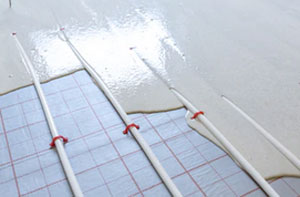
It may be a requirement, based on the proposed use of the area, for a structural engineering survey to conform to building regulations on flex strength, point loadings and load bearing of the screed floor.
The skills and training that a screeding contractor brings to your project will guarantee a high quality end result and help to prolong the lifetime of your floor or floors. Selecting the appropriate screeding materials and the method of installation is vital if you want a durable and quality finish for your floor surface.
Before picking out a floor screeding specialist from those operating in the Freshwater area, ask to what standard of finish they are basing their quote, and also ensure you get two or three quotations. For domestic homes a quotation will generally be given for a Surface Regularity (SR) level of SR1 or SR2. Each of the three SR levels offer different qualities of finish, with SR1 offering the highest, with the lowest amount of deviation over the area of the floor. An SR2 or SR3 level might mean there are ridges or flat spots that may cause problems when laying your final floor surface.
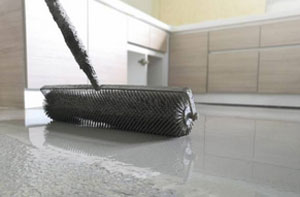
All Freshwater screeding contractors must follow British Standards (BS8204) and should have some form of accreditation from screeding material and equipment manufacturers, for instance Gypsol, Cemfloor, Flowcrete. This accreditation scheme illustrates a company's ability and training in the use of a manufacturer's merchandise.
Commercial screeders in Freshwater will usually undertake screeding projects in salons, factories, schools, hospitals, warehouses and shopping centres.
TYPES OF SCREED
Standard Screeds - This is okay for standard domestic use and comprises a mix of sand and cement. The standard screed is a mixture of 5 parts sand to one cement. The standard screed dries at a rate of 1mm thickness each day.
Polymer Screeds - These provide a high level of strength with a minimal thickness. Maker's guidelines for drying times differ across the product ranges.
Fibre Reinforced Screed - The expert's choice for domestic use over the top of underfloor heating. This is because of the improved durability and protection against thermal cracking and shrinkage provided by the special fibres within the screed. At approximately one millimetre per day, it has the same curing rate to standard screed.
Advanced Drying and Fast Drying Screeds - If you have to use the floor ASAP a fast drying screed can be used. The vast majority of the fast or advanced drying screeds are of the fibre reinforced kind and are perfect for a wide array of projects where the speedier drying rate of 3-7mm/day is a welcome advantage.
Liquid or Self-Levelling Screeds - When the highest possible standard of finish is needed this blend of latex and cement is used to create SR1 quality screeding. The self-levelling compound provides a smooth and level surface over a damaged floor or rough substrate to allow all sorts of flooring materials to be laid. These can be as little as one millimetre thick, and thanks to the latex polymers, will still provide a high strength finish.
Industrial and Heavy Duty Screed - Where levels of traffic are expected to be high or heavy loading of the floor is required, heavy duty screeds deliver maximum strength and durability.
SCREEDING PREPARATION AND INSTALLATION
Screeding companies will need to prepare the area before proceeding with any other work so as to ensure a high quality and hard wearing screed flooring. Any oil, grease, debris and paint on the existing floor level can affect the adhesion of the screed, and must be eliminated.
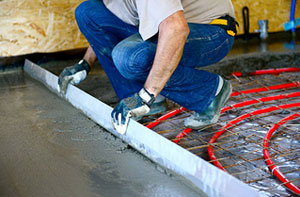
If cleaning products were used it is essential to remove any traces of soap or detergent, and allow the floor surface to dry naturally. If screeding over a stone or cement floor any cracks should be repaired to stop them from "travelling" up through the screed layer and resulting in deviations on the finished surface. An on-site survey will enable the screeding installer to pinpoint this preparation work and tackle it before beginning to pour the screeding.
Before the screeding can be laid a DPM (damp proof membrane) must be put down to protect the final flooring and screed from dampness. There could be 2 or 3 layers of different thicknesses of polythene to act as a barrier between the screed and the insulation layer.
If the area where you live is susceptible to radon gas then an additional barrier is necessary to prevent the gas from entering from the ground. An air-tight membrane may be suitable in locations with relatively low levels of radon, but in more extreme cases there might need to be a more sophisticated ventilation and extraction system to block any ground penetrating radon gases.
Once the base has been prepared and all DPMs installed, a sealer or primer is then put on. Primers and sealers help with the bonding process and are specialist applications matched to the sort of screed being used. Owing to their special nature, only professional screeding contractors in Freshwater are capable of using them correctly, safely and using bespoke equipment for the task.
Now is the time that underfloor heating can be laid out in the correct manner and installed. The under floor heating system is laid out in the correct pattern and secured firmly to insulation panels to avoid any movement during screed installation process. Under floor heating is one of the most efficient ways to heat a room and a professionally installed system will provide even level of warmth in all areas of the floor.
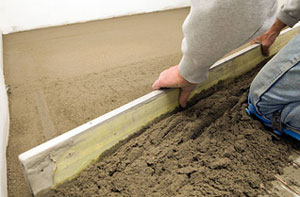
The screed can now be mixed and prepared in situ and applied to the base surface. Your screeding company will have given you advice on which type of screed is suitable for your requirements, in line with your proposed use of the room area. After application of the screed there'll be at least 24 hours (for quick drying screeds) before you can walk upon the surface, and a 72 hours minimum drying time before the laying of any flooring materials. If you're using standard or heavy duty screeds the drying time is longer and the manufacturer's guidelines must be adhered to so as to get the best finish for your floor.
You can test the SR level of the completed screeding once it is hard enough to walk on. Through the use of a 2 metre straight-edge the surface is checked for any deviations, ridges and dips in the screed surface.
- SR1 - Disparities of 3mm or less as measured across the whole area shows your screed floor to be of the finest quality and categorised as SR1.
- SR2 - The normal standard flooring in industrial and commercial builds is classed as SR2 and has a maximum possible deviation of five millimetres across the whole screeded surface.
- SR3 - For utility floors where the quality of finish is relatively unimportant the SR3 is the standard and should have a maximum deviation measurement of 10mm or less.
If you require load bearing checks, a structural engineer is required to conduct the tests. This test will determine the overall strength of the screeding and the viability for its proposed use. An assessment called the "drop hammer test" will be conducted on several areas of the screed and the results recorded. Any screed floor that has point load requirements must be sanctioned by a trained structural engineer observing the BS8204 regulations. (Tags: Floor Screed Freshwater, Screeding Freshwater, Floor Screeding Services Freshwater, Floor Screeding Freshwater).
Screeding is available in Freshwater and also nearby in: Thorley, Brook, Pound Green, Shalcombe, School Green, Chessell, Freshwater Bay, Norton Green, Thorley Street, Afton, Totland, Bouldnor, Easton, Yarmouth, Norton, Hulverstone, and in these postcodes PO40 9PX, PO40 9TA, PO40 9AU, PO40 9DP, PO40 9HZ, PO40 9HR, PO40 0AP, PO40 9AD, PO40 9ER, and PO40 9DW. Locally based Freshwater floor screeders will probably have the dialling code 01983 and the postcode PO40. Checking this out should make certain that you access local screeding. Freshwater householders can benefit from these and various other flooring related services. To obtain floor screeding quotes, click the "Quote" banner.
Granolithic Screeding
Granolithic screeding is a technique used to create a durable and hard-wearing surface, often required in industrial or commercial settings in Freshwater. The mixture consists of cement, sand, and fine aggregate, like granite or other hard stone, which provides additional strength and resilience compared to regular concrete. This screed is ideal for areas that will experience heavy traffic or machinery, as it withstands wear and tear effectively.
Typically, the installation process entails the application of the granolithic screed on a concrete subfloor that has been prepared. To ensure a smooth and even finish, the screed is meticulously levelled and compacted, preparing it for heavy use. It can also be finished with a polished effect, providing not only durability but an attractive, smooth finish for high-traffic areas like warehouses or workshops in Freshwater.
In addition to its durability, granolithic screeding is highly regarded for its cost-efficiency. After installation, it requires minimal care and can last for many years, making it an effective choice for both commercial and industrial settings. Whether it's for factories, loading bays, or spacious residential garages, granolithic screeding delivers a durable flooring option. (Tags: Granolithic Screeding Freshwater)
Polished Floor Screeds Freshwater
Polished screeds are increasingly chosen by householders in Freshwater who want a chic and contemporary floor. These floor screeds, which involve a smooth, trowel-finished surface, provide a durable and aesthetically pleasing foundation for various living spaces. This process involves applying a cement-based material and polishing it to achieve a high-gloss finish, resulting in a floor that is practical as well as eye-catching.

The low maintenance demands of polished screed floors are one of their key benefits. Polished screeds, unlike conventional flooring solutions, don't need to be waxed or sealed on a regular basis. For allergy and asthma sufferers, the smooth surface of polished screeds offers resistance to allergens and dust, making them a compelling choice. To achieve lasting performance, polished screeds are crafted with exceptional wear resistance, minimising the need for costly replacements and repairs.
The flexibility offered by polished screeds is also something that Freshwater householders can enjoy. With a wide array of finishes and colours at your disposal, polished screeds can be the perfect finishing touch to complement your existing design scheme. Polished screeds can enhance the overall appearance of a property, whether one opts for an intricate pattern or a more low-key, minimalist design. In addition to that, the reflective surface that they create can enhance brightness in rooms by maximising natural daylight, resulting in a more spacious and inviting atmosphere. (Polished Floor Screeds Freshwater)
Latex Floor Screeds
For creating smooth, level surfaces before laying final floor coverings, latex floor screeds are a popular option. These screeds, made by combining cement and latex, are both flexible and easy to apply. These are perfect for uneven or cracked floors, as the latex helps the screed to adhere well and prevents cracking.
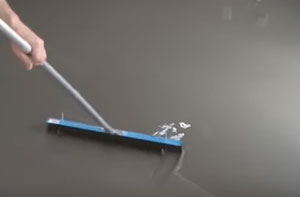
Applying latex floor screeds is an uncomplicated task. Initially, the floor must be cleaned and primed to ensure it adheres well. The latex mixture is then poured onto the floor and distributed evenly using a trowel. This results in a level, smooth surface, ready for tiles, vinyl, or other floor coverings, once it has dried.
One of the primary advantages of latex screeds is how quickly they dry. In contrast to conventional screeds, latex screeds offer the advantage of a drying time of just a few hours, permitting earlier foot traffic. The quick drying time of latex floor screeds makes them an excellent option for both commercial and residential projects with tight schedules. (Latex Floor Screeds)
Acid Etching Concrete Freshwater
To prepare concrete surfaces for finishing, acid etching is often employed. A solution of water and acid is applied to the concrete during acid etching to clean and roughen the surface. This process aids the sealant or new coating in adhering more effectively, ensuring a finish that lasts longer and is more durable.
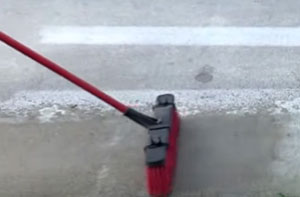
The process starts by thoroughly cleaning the concrete surface to remove any dirt, grease or debris. After cleaning, the concrete surface is evenly covered with the acid solution. By reacting with the concrete, the acid creates a slightly rough texture, improving the adhesion for subsequent sealants, paints, or finishes.
Safety precautions are important when acid etching concrete due to the hazardous nature of the acid. Wearing protective gear, such as gloves, goggles, and a mask, is crucial to prevent contact with the skin and eyes. To avoid risks and ensure a quality finish, hiring a specialist is recommended.
Once the acid has completed its task, the concrete is thoroughly rinsed with water to neutralise the acid and eliminate any residue. This prepares the surface for the subsequent application of stain, sealant or paint. (Acid Etching Concrete Freshwater)
Screed Floor Sealing Freshwater
Flooring specialists carry out screed floor sealing to protect and improve the durability of screed floors, making it a necessary process. A level, smooth surface perfect for flooring is created by screed, which is a mix of sand and cement. However, sealing is a necessary step to preserve its integrity and appearance. A professional will use a high-quality sealant to penetrate the screed, offering a protective barrier against wear, stains and moisture.
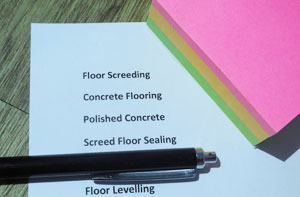
To remove any debris, dust or dirt, the sealing procedure begins with a thorough cleaning of the screed floor. As soon as the floor is dry and clean, the sealant is applied evenly across the surface. By doing this, any tiny pores or cracks are filled in, and the sealant covers all areas of the screed successfully. The sealant usually needs time to dry and cure, forming a durable and long-lasting protective layer.
Not only does having a professional seal your screed floor extend its lifespan, but it also improves its appearance. By giving the floor a smooth, polished finish, the sealing process makes cleaning and maintenance easier. It also helps prevent damage from spillages and heavy foot traffic, making it a worthwhile investment for both domestic and commercial properties in Freshwater. (Screed Floor Sealing Freshwater)
Screed Reinforcement
Improving the strength and durability of concrete screeds can be achieved by using screed reinforcement. Screeds are thin, flat layers of concrete that are applied to a base layer to create a level surface. They are commonly used in construction projects for flooring, and can also be used as a finishing layer for ceilings and walls.
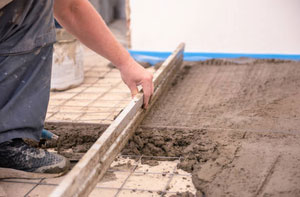
Screed mixture during installation is infused with reinforcement materials, such as fibres, steel mesh or wire, to prevent cracking and improve strength. Weight and load are evenly distributed across the surface by this reinforcement, which also improves its ability to resist thermal changes, impact and abrasion.
In addition to increasing the strength and durability of screeds, the reinforcement process decreases the likelihood of cracking and shrinkage caused by changes in temperature or humidity. The proper installation of the reinforcement is crucial to guarantee even distribution throughout the screed and avoid displacement over time. By ensuring the quality and structural integrity of screeds, screed reinforcement provides a long-lasting and reliable surface suitable for various applications, making it an essential component of the screeding process in many projects.
Multi-Coloured Floor Screeds
Multi-coloured floor screeds are a fantastic way to bring both personality and practicality into any environment. These decorative options blend durability with striking design, resulting in a seamless flooring solution that is both tough and visually appealing. Whether you're outfitting commercial spaces, industrial zones, or trendy homes in Freshwater, multi-coloured screeds provide a distinctive mix of style and usefulness. Their lively finishes allow for tailored choices, giving you the freedom to reflect your personal style or brand identity through colours and patterns.
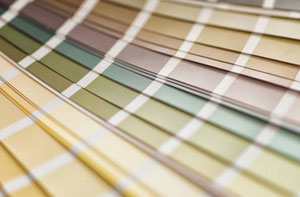
Multi-coloured floor screeds are particularly noted for their versatility, which is a fantastic feature. They excel in high-traffic areas because they withstand wear and tear quite well, and the seamless finish allows for easy cleaning and maintenance. In commercial settings, bold and vibrant colour combinations can really grab attention or help delineate separate zones within a space. For home environments, opting for softer tones and detailed patterns can introduce a touch of modern elegance to kitchens, bathrooms, or living spaces.
It's not just about how they look; multi-coloured screeds are a long-term investment in durability. Built to be hard-wearing, they can handle even the most challenging environments. They can also be customised to address specific needs, like ensuring slip resistance or providing extra protection from spills and chemicals. Whether you want to rejuvenate an old floor or create a striking design statement, multi-coloured floor screeds are a fashionable and functional option for your home or business in Freshwater. They perfectly combine practicality with style, allowing you to transform any space into something extraordinary. (Tags: Multi-Coloured Floor Screeds Freshwater).
What Does Screeding Do?
Construction projects benefit from the various important functions of screeding:
- Levelling and Smoothing.
- Support for Underfloor Heating Systems.
- Compatibility with Floor Finishes.
- Surface Protection.
- Stability and Structural Integrity.
- Load Distribution.
- Improving Thermal and Sound Insulation.
- Subfloor Corrections.
All in all, screeding assumes a vital role in the creation of a stable, durable and level floor surface. Its role is to secure a solid foundation for the floor finish, allowing it to maintain its aesthetics and quality, and endure the demands of everyday use for years to come.
Screed Floor Removal
Stripping away existing layers of screed from floor surfaces is a vital process in renovation and construction. This is done by screed floor removal. This procedure removes old flooring and prepares the surface for the new flooring material or other improvements, leaving a clean and smooth surface ready for the next step.
Screed floor removal is an complex task that's best left to skilled contractors who have experience in this field. The safe and successful elimination of the old screeding sets the stage for a new lease of life for the floor, which is ensured by their proficiency. The enormous significance of this fresh start isn't limited to changes in design, repairs or upgrades.
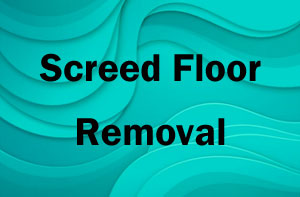
Removing floor screed is a specialised process that requires the use of specialised techniques and equipment. It requires careful consideration of the thickness and type of the existing screed, as well as the surface it is installed on. Attention to detail is essential for effective removal with minimal damage to the underlying structure.
A key benefit of removing floor screed is the opportunity to fix any problems that have developed over the years. A thorough inspection of the substrate can be performed by removing the old layer of screed, if it's damaged, uneven, or compromised. By performing this inspection, contractors can identify and fix any structural issues before installing new flooring materials.
Furthermore, the elimination of the screed floor is an imperative initial process for the installation of underfloor heating systems in Freshwater. The removal of the existing screed allows contractors to establish a clean and level surface, suitable for the installation of heating elements. This approach facilitates an effective and efficient underfloor heating system, thereby increasing the space's comfort and energy efficiency.
The removal of screed flooring is aligned with sustainability goals, emphasising waste reduction and reusability. Repurposing or recycling the extracted screed for other construction projects often reduces the environmental impact associated with its removal.
To summarise, a crucial and complex process in the realm of construction and renovation is screed floor removal. It is necessary for specialist contractors to have expertise in navigating the complexities of removing existing screed layers while ensuring the safety and integrity of the base structure. Screed floor removal, plays a vital role in the creation of efficient, hard-wearing, and aesthetically pleasing flooring solutions in a variety of settings in Freshwater, and enables a fresh start for the floor. (27543 - Floor Screed Removal Freshwater)
Floor Screeding Near Freshwater
Also find: Chessell floor screeding, School Green floor screeding, Pound Green floor screeding, Easton floor screeding, Thorley Street floor screeding, Norton Green floor screeding, Hulverstone floor screeding, Brook floor screeding, Freshwater Bay floor screeding, Yarmouth floor screeding, Shalcombe floor screeding, Norton floor screeding, Thorley floor screeding, Totland floor screeding, Bouldnor floor screeding, Afton floor screeding and more. Screeding services are widely available in the majority of these places. The expertise and knowledge required to provide top-notch flooring services are possessed by these competent professionals. They are well-versed in screeding, making sure that the project is executed to the highest possible standards, be it for domestic or commercial properties. By simply clicking here, screeding quotes are accessible to local householders.

Other Trades Freshwater: Not surprisingly, whenever you're doing home improvements and repairs in Freshwater, you will likely need all types of different tradespeople and together with screeding in Freshwater, you might additionally need SKIP HIRE Freshwater, garage conversion in Freshwater, a general builder in Freshwater, an odd job man in Freshwater, hardwood flooring in Freshwater, a stonemason in Freshwater, driveway cleaning in Freshwater, damp proofing in Freshwater, an underfloor heating specialist in Freshwater, a plumber in Freshwater, an electrician in Freshwater, a carpenter/joiner in Freshwater, a carpet fitter in Freshwater, and several other different Freshwater tradesmen. Simply click on the highlighted links to send in enquiries and get price quotes.
Local Screeding Enquiries

Recent floor screeding customer projects: Tiffany Owen and Nathan Owen recently asked for a quotation for screeding a kitchen and lounge floor in a semi-detached house in Easton. Mr and Mrs Lane recently requested a quotation for screeding a floor and installing underfloor heating in Afton. Dylan Lawson and Madison Lawson recently requested a quotation for screeding a kitchen floor in Norton Green. Victoria Richards and Matthew Richards recently asked for a quotation for screeding a kitchen and lounge floor in a semi-detached house in Thorley Street. Amber Hall in Easton asked the question "is there anyone who does floor screeding near me?". Alexis Ward recently asked for a quotation for screeding a property extension floor in Norton. Jason Bradley in Norton was looking for a floor screeding company to lay a flow screed in his property. Matthew Bennett in Pound Green was looking for a floor screeding company to lay a flow screed in his property. Anthony Ellis and Kelsey Ellis recently enquired about getting a price for screeding a workshop floor in Freshwater Bay. Mr and Mrs White recently requested a quotation for screeding a floor and installing underfloor heating in Pound Green. Elizabeth Jenkins recently asked for a quotation for screeding a property extension floor in Freshwater Bay. Robert Jenkins recently requested an estimate for screeding the floor of a garage in Thorley Street. Jessica Wood from Easton was looking for a local floor screeding company to lay a liquid screed in her property. All these homeowners conducted a search for "floor screeding near me" and discovered this page on Yahoo, Google or Bing.
Freshwater Screeding Related Tasks

There is a range of work that can be completed by your local Freshwater floor screeder including bonded screed, wet room floors, cellar screeding, polished floor screeding, external screeding, floor levelling, floor insulation, floor resurfacing, rapid drying screeds, professional floor levelling services, concrete toppings, shop floor screeding in Freshwater, polished concrete flooring, granolithic screeds , underfloor heating screed, pumped screeds in Freshwater, garage floor screeding, kitchen floors, unbonded screed, screed flooring, floating screed, concrete moisture testing services, floor preparation, monolithic floor screeding, polished screed floors, underfloor heating installation, acid etching concrete, screed laitance removal in Freshwater, liquid screeding, screeding price quotes, and more floor screeding tasks. Listed are just a small portion of the tasks that are performed by those installing screeding. Freshwater providers will be delighted to keep you abreast of their whole range of services.
More: Floor Screeders, Commercial Screeding, Floor Screeding, Screeding, Screed Floors, Cheap Screeding, Residential Screeding, Screeding Services, Polished Screeding, Self-Levelling Screeds, Coloured Screeding, Screeding Companies, Polished Screeding, Self-Levelling Screeds, Floor Levelling, Screed Flooring, Coloured Screeding, Floor Levelling, Flooring Contractors, Cheap Floor Screeding, Decorative Screeding, Screed Floors, Screed Reinforcement, Cheap Screeding, Polished Screeding, Screed Floors, Commercial Screeding, Flooring Contractors, Screeding Specialists, Screeding Services, Screed Floors, Polished Screeding, Screeding Contractors, Polished Screeding, Driveway Experts, Driveway Specialists, Driveway Services.
TOP - Floor Screeding Freshwater
Floor Screed Contractors Freshwater - Screeding Freshwater - Residential Screeding Freshwater - Floor Screeder Freshwater - Self-Levelling Screeding Freshwater - Floor Screeding Near Me - Floor Screeding Contractors Freshwater - Quick-Dry Screeding Freshwater - Floor Screeding Services Freshwater


